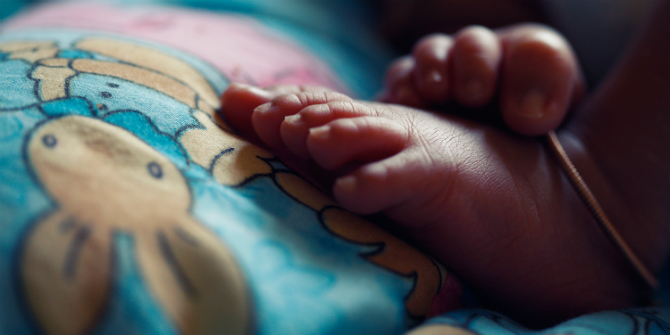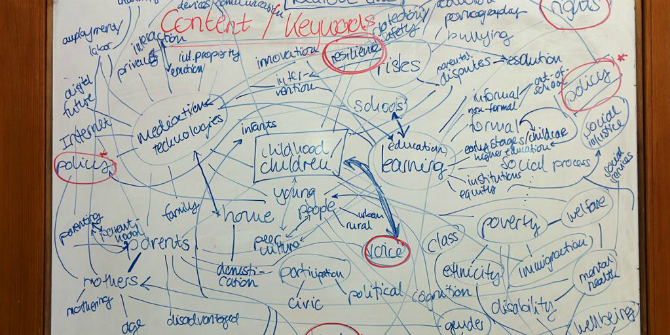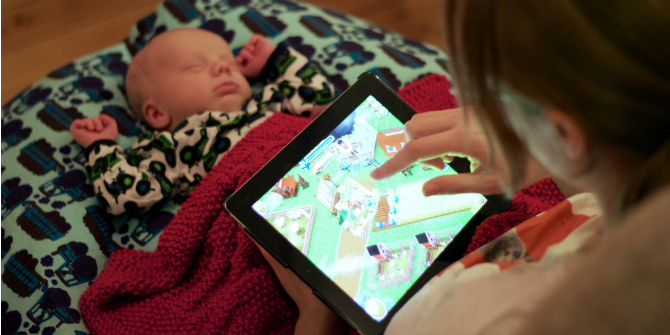 Guest blogger Wendy M. Grossman discusses the Instagram trend of ‘baby role-playing’, how parents might think about this and the legal and ethical challenges of sharing social media photos of children that are not your own. Wendy writes about the border wars between cyberspace and real life. She is the 2013 winner of the Enigma Award and she has released a number of books, articles, and music.
Guest blogger Wendy M. Grossman discusses the Instagram trend of ‘baby role-playing’, how parents might think about this and the legal and ethical challenges of sharing social media photos of children that are not your own. Wendy writes about the border wars between cyberspace and real life. She is the 2013 winner of the Enigma Award and she has released a number of books, articles, and music.
How do parents think about online “baby role-playing”? Although the BBC and the Daily Mail seem to have just discovered it, the Washington Post outlined this Instagram fantasy game in September 2014, and noted that a Change.org petition to ask Instagram to deactivate baby role-play accounts had been circulating for more than a year – that is, since the summer of 2013.
It goes like this: strangers, usually anonymous, copy pictures of other people’s children and post them on their Instagram accounts with imaginary names and descriptions which then form a basis for comment discussion with followers, who find the postings via hashtags, such as #babyrp.
Fast Company reports that most of the participants are themselves teenagers, many from unhappy backgrounds, and you can see the logic: they post similarly borrowed pictures of their fantasy weddings, bridal gowns, and homes. US television fuels this further: reality shows allow viewers to watch, critique, and fantasize as couples plan their weddings or search for a new home. Posting images of fantasy families and children seems like the logical next step. It’s also a logical next step in a chain that began in the analogue world with scrapbooks of cut-out magazine photographs, dolls and dollhouses and moved to computer games like The Sims and virtual worlds like Second Life, and now mines the ready availability of children’s images on social media.
At Mamamia, Holly Wainwright reports that some forums for those wanting to have children have some areas where particularly desperate childless people can play out fantasy lives in which they have children – but bans the use of photos. This, for me, echoes the science fiction writer Philip K. Dick’s 1965 novel The Three Stigmata of Palmer Eldritch, about colonists on Mars whose only escape from their dreary, constrained lives was to take drugs that projected them into elaborate dollhouses mimicking their former, comfortable lives on Earth. Virtual worlds, fantasy lives, escape: these are all themes as old as humanity. What’s new is playing out what were private fantasies in a public setting as a group activity and the use of images of other people’s children.
That doesn’t help the parent who has just found their child’s photograph at the centre of one of these exercises and feels they’ve been punched in the gut.
Lucy Sherriff, a former technology journalist and mother of two who has grown up conversant with the internet, says:
Although no real physical harm would be done, I dislike the idea of someone claiming ownership of my child, and would worry about stalking as a side effect – someone of unstable mind building a fake relationship with a child is unsettling as a thought. If there was geographical closeness as well, then it becomes quite scary.
We might be observing the detachment effect psychologists have noted with respect to both television and the internet, as well as the law of large numbers. Just as one person killed is a tragedy but 100,000 is a statistic, one photograph of a friend’s child is cherished, but hundreds of photograph of anonymous children of strangers, are just objects. The emotional language found in tabloid accounts tries to punch through this but fails at accuracy: this virtual appropriation is not “kidnapping”, and the pictures are not “stolen”, since the parent still has both the real child and the original photographs.
Instagram, which is owned by Facebook but operates as an independent community, says the practice contravenes its terms and conditions. Removing this activity from Instagram won’t end it, though: it will simply move to less regulated – and less visible – areas.
That’s one reason regulating this is hard. In the UK, censorship of written words ended with the trial of Lady Chatterley’s Lover. Under copyright law, reposting pictures without the rights holder’s consent is definitely illegal, but hard to enforce at the individual level. The two big digital picture agencies, Corbis and Getty, and child protection organisations use automated software to crawl the internet searching for known images. But these rely on large, databases of known images. Nothing like that exists for the billions of social media users casually sharing family photographs, a practice amongst parents labelled “sharenting” and discussed in a previous post on this blog. All social media sites have established procedures for notice-and-takedown of copyright violations, but first you must know the photographs have been copied and posted.
Although many schools ban or control photography there is actually no law prohibiting posting children’s photographs online without consent, says Nicholas Bohm, an advisor to the Foundation for Information Policy Research and the Open Rights Group. The millions of photographs on social media give easy access, but pictures of random children are easily captured in daily life. Stopping the flow of accessible source material is close to impossible.
In situations where casual fantasy turns into real-life obsession, Sherriff suggests that anti-stalker laws should apply. In such a situation, effective enforcement requires the police to take the case seriously and act appropriately. In most cases, however, parents will have to weigh posting pictures against the reality that once something is out on the internet they have effectively lost control. “I would add it to my list of reasons why I don’t post many pictures of the kids online, and only on my locked-down Facebook account,” says Sherriff.






